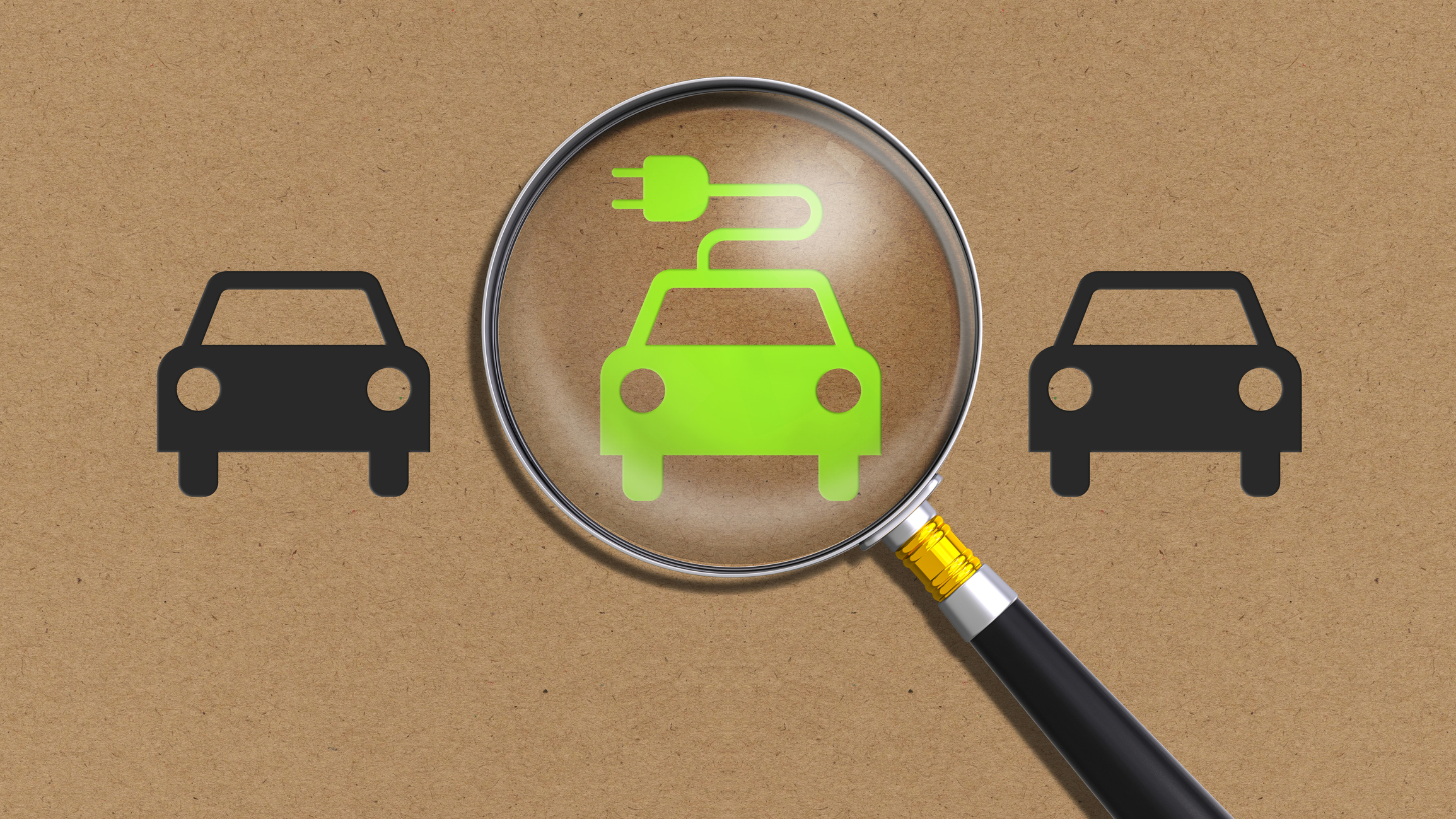How the EV Tax Credit Works for 2025
The EV federal tax credit of up to $7,500 was already a bit complicated for buyers and manufacturers. But Trump's new tax bill brought the initiative to an end sooner than expected. Here's what you should know.


Profit and prosper with the best of Kiplinger's advice on investing, taxes, retirement, personal finance and much more. Delivered daily. Enter your email in the box and click Sign Me Up.
You are now subscribed
Your newsletter sign-up was successful
Want to add more newsletters?

Delivered daily
Kiplinger Today
Profit and prosper with the best of Kiplinger's advice on investing, taxes, retirement, personal finance and much more delivered daily. Smart money moves start here.

Sent five days a week
Kiplinger A Step Ahead
Get practical help to make better financial decisions in your everyday life, from spending to savings on top deals.

Delivered daily
Kiplinger Closing Bell
Get today's biggest financial and investing headlines delivered to your inbox every day the U.S. stock market is open.

Sent twice a week
Kiplinger Adviser Intel
Financial pros across the country share best practices and fresh tactics to preserve and grow your wealth.

Delivered weekly
Kiplinger Tax Tips
Trim your federal and state tax bills with practical tax-planning and tax-cutting strategies.

Sent twice a week
Kiplinger Retirement Tips
Your twice-a-week guide to planning and enjoying a financially secure and richly rewarding retirement

Sent bimonthly.
Kiplinger Adviser Angle
Insights for advisers, wealth managers and other financial professionals.

Sent twice a week
Kiplinger Investing Weekly
Your twice-a-week roundup of promising stocks, funds, companies and industries you should consider, ones you should avoid, and why.

Sent weekly for six weeks
Kiplinger Invest for Retirement
Your step-by-step six-part series on how to invest for retirement, from devising a successful strategy to exactly which investments to choose.
Summary: The federal clean-vehicle tax credit (EV tax credit) —worth up to $7,500 for new EVs and $4,000 for used ones — expired for purchases after September 30, 2025. Eligible buyers who entered a binding contract or completed a qualifying purchase before that date can generally still claim the credit on their 2025 tax return. Eligibility depends on income and vehicle-price limits, plus North American assembly and battery-component rules established under the Inflation Reduction Act.
A federal tax credit for electric vehicles (EVs) was available thanks to the Inflation Reduction Act (IRA), a massive piece of legislation promoting clean energy enacted during the Biden administration.
The credit, which was up to $7,500 for qualifying EVs, known as "clean vehicles," and $4,000 for used models, was intended to encourage EV adoption.
From just $107.88 $24.99 for Kiplinger Personal Finance
Become a smarter, better informed investor. Subscribe from just $107.88 $24.99, plus get up to 4 Special Issues

Sign up for Kiplinger’s Free Newsletters
Profit and prosper with the best of expert advice on investing, taxes, retirement, personal finance and more - straight to your e-mail.
Profit and prosper with the best of expert advice - straight to your e-mail.
But the EV incentive has ended much sooner than many expected.
With the passage of President Donald Trump’s 2025 tax reform, known by some as the "big beautiful bill," the federal EV tax credit has expired for vehicles purchased or leased after September 30, 2025.
However, this tax break has always been a bit complicated, and there are many questions about how the EV tax credit works.
Key points
- The federal tax credit for new and used EVs ended after September 30, 2025. To claim up to $7,500 for a new EV or $4,000 for a used vehicle, you had to purchase before the deadline. Update: Previously, you had to take delivery of the vehicle by September 30. However, recent IRS guidance offers some relief on that aspect. (More on that below.)
- Eligibility rules apply. Income limits and vehicle price caps apply.
- The phase-out happened faster than previously planned. The new law accelerated the end date, removing the credit for all buyers regardless of manufacturer.
- Some industry experts warn of a likely slowdown in EV adoption now that the the credit has disappeared, as most buyers will lose the upfront cost advantage. Some state and local incentives might remain in effect.
Let's dive in and clarify which vehicles qualify and why. If you’re eligible, you need to know how to claim the EV credit when you file your federal income tax return with the IRS.
EV Tax Credit Overview
How does the EV tax credit work for 2025?
Here are some of the key points to know about how the federal electric vehicle tax credit works.
- Under the OBBB, the EV tax credit was in place only until September 30, 2025.
- The tax credit is taken in the year you take delivery of a qualifying "clean vehicle."
- The incentive is up to $7,500 for new vehicles. The credit amount considers factors such as the vehicle’s sourcing and assembly (which must primarily be in North America for the full credit) and when you placed your vehicle into service. (More on all of that below.)
- Certain used/previously owned EVs can qualify for a tax credit of up to $4,000 or 30% of the sales price (whichever is less).
- As of January 1, 2024, eligible buyers could take the EV tax credit as a discount when purchasing a qualifying vehicle.
However, an important point is that there are income limits for the clean vehicle tax break. Here’s what you need to know.
EV Income Limits
EV tax credit income limits for new and used EVs
Your modified adjusted gross income (MAGI) is used for the following income limits, which apply to qualifying new clean vehicles.
(MAGI, found on Line 11 of Form 1040, often determines your eligibility for various tax breaks and is generally your adjusted gross income (AGI) with certain deductions or income exclusion added.)
When claiming the EV credit, the IRS says that you can use the lesser of your MAGI in the year you take delivery of your EV or your MAGI from the year before you took delivery of the vehicle.
Income limits for new qualifying electric vehicles
SINGLE | Modified AGI over $150,000 | Don't qualify for the EV credit |
MARRIED (Filing Jointly) | Modified AGI over $300,000 | Don't qualify for the EV credit |
HEAD OF HOUSEHOLD | Modified AGI over $225,000 | Don't qualify for the EV credit |
ALL OTHER FILERS | Modified AGI over $150,000 | Don't qualify for the EV credit |
You don't qualify for the EV tax credit if you're single and your modified adjusted gross income exceeds $150,000.
The EV tax credit income limit for married couples filing jointly is $300,000.
If you file as head of household and make more than $225,000, you also won’t be able to claim the electric vehicle tax credit.
The EV credit income limit is $150,000 for all other filing statuses.
Qualifications and income limits for used EVs
You must meet the following criteria to qualify for the federal EV tax credit for eligible used/previously owned clean vehicles.
- Be an individual who bought the vehicle for use, not for resale
- Not be the original owner
- Not be claimed as a dependent on another person’s tax return
- Not have claimed another used clean vehicle credit in the three years before the purchase date
Additionally, for the EV tax credit for used vehicles, the IRS says your MAGI can't exceed the following income limits.
$150,000 | MARRIED FILING JOINTLY OR SURVIVING SPOUSE |
$112,500 | HEAD OF HOUSEHOLD |
$75,000 | ALL OTHER FILING STATUSES |
- $150,000 for married filing jointly or a surviving spouse
- $112,500 for heads of households
- $75,000 for all other filers
*You can use your MAGI from the year you took delivery of the vehicle or the year before, whichever is less.
Qualifying Vehicles
Which vehicles qualify for EV tax credit in 2025?

Once you know if you’re income-eligible to claim the electric vehicle tax credit, a big question on EV buyers’ minds is which vehicles qualify.
The short answer is that not many models qualify for the full $7,500 electric vehicle tax credit. Others qualify for half that amount, and some don’t qualify at all.
But first, price limits determine whether a vehicle is eligible for the tax credit.
EV credit vehicle price limits for new vehicles
- Vans, pickup trucks and SUVs with a manufacturer’s suggested retail price (MSRP) of more than $80,000 won’t qualify for the credit.
- For clean cars to qualify for the EV tax credit, the MSRP couldn't be more than $55,000.
- A previously owned clean vehicle will qualify for the tax credit only if it cost $25,000 or less.
Note: “Used” or “previously owned” for the EV tax credit purposes means that the car is at least two years old.
Price limits for used EVs
A used/previously owned electric vehicle must meet the following requirements to qualify for the up to $4,000 federal EV tax credit.
- Have a sale price of $25,000 or less
- Have a model year at least two years earlier than the calendar year when you buy it (For example, a vehicle purchased in 2025 would need a model year of 2023 or older.)
- Not have already been transferred to a qualified buyer after August 16, 2022
- Have a gross vehicle weight rating of less than 14,000 pounds
- Be an eligible FCV or plug-in EV with a battery capacity of at least seven kilowatt hours
- Be for use primarily in the U.S.
2025 EV tax credit eligible vehicles
You can find the complete list of vehicles qualifying for the credit on the federal fueleconomy.gov website. Notably, several vehicles that were eligible for the EV tax credit last year were not eligible in 2025.
The Department of Transportation also has a tool on its website to enter the vehicle identification number (VIN) of the electric vehicle you're interested in to determine its eligibility for the EV tax credit. This guidance might help you decide when it’s best (tax-wise) to buy an EV.

Tesla tax credit
As of July 2025, some Tesla models were eligible for the federal EV tax credit, but only until September 30, when the program officially ended. The requirements are stricter than before, and only certain versions of Tesla vehicles made the cut.
Which Teslas Qualified?
- Model 3: The Long Range (AWD and RWD) and Performance trims generally qualify, as long as the sticker price was $55,000 or less.
- Model Y: Most long-range and Performance versions were eligible if the price remained under $80,000.
- Cybertruck and Model X: Only specific configurations — typically the lower-priced or dual-motor versions — might qualify, depending on how they were built and priced.
Always confirm eligibility with official government resources.
Commercial EVs
Last fall, Mullen Automotive (NASDAQ: MULN) became an IRS “qualified manufacturer” of commercial EVs. The designation meant that some of the automaker’s electric vehicles qualified for the up to $7,500 EV tax credit.
Regarding the new designation, John Schwegman, Mullen’s chief commercial officer, acknowledged in a statement that the total cost of ownership is important to commercial customers.
Mullen’s commercial EVs qualify for the 2025 federal tax credit, but with stricter battery sourcing and assembly rules in place since last year.
EV Credit Point of Sale
What is the EV tax credit point of sale rebate?
Another new EV tax credit benefit started last year. If you’re buying a qualifying clean vehicle, as of January 1, 2024, you might have had the option to take the EV tax credit as a discount at the point of sale when you purchased the vehicle.
- Essentially, you were transferring the credit to the dealer, who could lower the vehicle price by the amount of the credit.
- That meant you didn't have to wait until it’s time to file your tax return to benefit from the electric vehicle tax credit.
- Dealers had to register to be qualified to pass EV credit savings to consumers.
Qualified dealers couldtransfer the value of the federal EV tax credit on eligible vehicles for eligible consumers (income limits apply).
That value could either be a cash refund or, as previously mentioned, a discount on the total price of the electric vehicle.
Related: Point of Sale EV Credit is a Hit: What to Know

Claiming the EV Tax Credit
How to claim the $7,500 EV tax credit on your return
To claim the EV tax credit, you file IRS Form 8936 with your federal income tax return.
You’ll need the VIN for your electric vehicle to complete the form.
Form 8936 is used to determine your tax credit for qualified two- or three-wheeled plugin electric vehicles.
Update: The IRS confirmed in guidance posted to its website that the critical date for eligibility to claim the EV credit for 2025 will be when a binding written purchase agreement is signed and a payment is made, not when the vehicle is delivered.
That gave some buyers a little more time to take delivery of the vehicle. But: The purchase agreement had to be executed by September 30, 2025, regardless of the delivery date.
EV Leases
What if you're leasing an EV?
There was a tax credit available for leased electric vehicles. But there’s also a “catch.” The tax credit belonged to the lessor, not to you, the lessee.
Under the IRA, leased electric vehicles were classified as "commercial vehicles," making them eligible for the entire federal clean vehicle credit without meeting strict battery and sourcing requirements.
That meant you could have a more comprehensive selection of electric vehicles to save money if the dealer agreed to pass any tax credit savings on to you.
However, remember that the lessor receives the tax credit (not you). Any savings you received would be in the form of a rebate or a reduced lease price.
Since the Republican-led Congress has passed Trump's 2025 tax reform, clean energy credits, including the tax credit applicable to leased EVs, are being eliminated after September 30, 2025.
More from Kiplinger Leasing an EV? The Tax Credit 'Loophole' for That Is Going Away
Home EV Chargers
Is there a federal EV charger tax credit?

If you're in the market for an EV home charger, the "Alternative Fuel Refueling Property tax credit" was extended under the Biden administration through December 31, 2032, but will now end under Trump's new tax bill after June 30, 2026.
For more information on the federal tax credit for electric vehicle chargers, see Kiplinger's guide to the federal EV charger tax credit.
Read More
- The Federal EV Charger Tax Credit: What to Know
- Tax Credits for Energy-Efficient Home Improvements Are Ending Soon
- Trump's 'One Big Beautiful Bill': What's In It?
- EV Owners Can't Avoid Road Taxes in 2025
Profit and prosper with the best of Kiplinger's advice on investing, taxes, retirement, personal finance and much more. Delivered daily. Enter your email in the box and click Sign Me Up.

Kelley R. Taylor is the senior tax editor at Kiplinger.com, where she breaks down federal and state tax rules and news to help readers navigate their finances with confidence. A corporate attorney and business journalist with more than 20 years of experience, Kelley has helped taxpayers make sense of shifting U.S. tax law and policy from the Affordable Care Act (ACA) and the Tax Cuts and Jobs Act (TCJA), to SECURE 2.0, the Inflation Reduction Act, and most recently, the 2025 “Big, Beautiful Bill.” She has covered issues ranging from partnerships, carried interest, compensation and benefits, and tax‑exempt organizations to RMDs, capital gains taxes, and energy tax credits. Her award‑winning work has been featured in numerous national and specialty publications.
-
 Quiz: Do You Know How to Avoid the "Medigap Trap?"
Quiz: Do You Know How to Avoid the "Medigap Trap?"Quiz Test your basic knowledge of the "Medigap Trap" in our quick quiz.
-
 5 Top Tax-Efficient Mutual Funds for Smarter Investing
5 Top Tax-Efficient Mutual Funds for Smarter InvestingMutual funds are many things, but "tax-friendly" usually isn't one of them. These are the exceptions.
-
 AI Sparks Existential Crisis for Software Stocks
AI Sparks Existential Crisis for Software StocksThe Kiplinger Letter Fears that SaaS subscription software could be rendered obsolete by artificial intelligence make investors jittery.
-
 In Arkansas and Illinois, Groceries Just Got Cheaper, But Not By Much
In Arkansas and Illinois, Groceries Just Got Cheaper, But Not By MuchFood Prices Arkansas and Illinois are the most recent states to repeal sales tax on groceries. Will it really help shoppers with their food bills?
-
 New Plan Could End Surprise Taxes on Social Security 'Back Pay'
New Plan Could End Surprise Taxes on Social Security 'Back Pay'Social Security Taxes on Social Security benefits are stirring debate again, as recent changes could affect how some retirees file their returns this tax season.
-
 Can I Deduct My Pet On My Taxes?
Can I Deduct My Pet On My Taxes?Tax Deductions Your cat isn't a dependent, but your guard dog might be a business expense. Here are the IRS rules for pet-related tax deductions in 2026.
-
 Tax Season 2026 Is Here: 8 Big Changes to Know Before You File
Tax Season 2026 Is Here: 8 Big Changes to Know Before You FileTax Season Due to several major tax rule changes, your 2025 return might feel unfamiliar even if your income looks the same.
-
 2026 State Tax Changes to Know Now: Is Your Tax Rate Lower?
2026 State Tax Changes to Know Now: Is Your Tax Rate Lower?Tax Changes As a new year begins, taxpayers across the country are navigating a new round of state tax changes.
-
 3 Major Changes to the Charitable Deduction for 2026
3 Major Changes to the Charitable Deduction for 2026Tax Breaks About 144 million Americans might qualify for the 2026 universal charity deduction, while high earners face new IRS limits. Here's what to know.
-
 Retirees in These 7 States Could Pay Less Property Taxes Next Year
Retirees in These 7 States Could Pay Less Property Taxes Next YearState Taxes Retirement property tax bills could be up to 65% cheaper for some older adults in 2026. Do you qualify?
-
 Estate Tax Quiz: Can You Pass the Test on the 40% Federal Rate?
Estate Tax Quiz: Can You Pass the Test on the 40% Federal Rate?Quiz How well do you know the new 2026 IRS rules for wealth transfer and the specific tax brackets that affect your heirs? Let's find out!